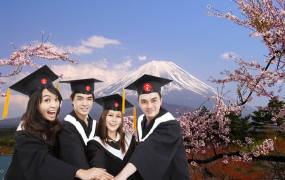Japan
LINK
Which area should I go to study in Japan?
Japan is a nation that is not only developing economically but also has some of the best educational systems in the world. Many young Vietnamese individuals have recently decided that studying in Japan is the best way to start their future. Many of you, however, are unsure about how to locate a Japanese language school in Japan where you may learn.
Which subject would you pick to study in Japan? What standards should you use to select a Japanese language school that meets your needs and your circumstances? We'll examine a few subjects that many students today choose to study in Japan.
Which regions in Japan are more vulnerable to earthquakes due to the climate?
The four different seasons of spring, summer, fall, and winter are the most notable aspect of the Japanese climate.
Winter: May through May
June through August is considered summer.
Fall: September to November
December to February is winter.
The northernmost area, Hokkaido, has a moderate climate with lengthy, chilly winters and chilly summers. Although there is hardly much rain, the islands sometimes get inundated during the winter by huge snow drifts.
An area that is vulnerable to earthquakes and tsunamis is the Tohoku region (yellow).
Due to the mountains of Chugoku and Shikoku, the weather remains chilly all year round.
A typical inland environment with significant seasonal variations from summer to winter and from day to night. a little rain.
Cities in Japan where you may study abroad
-
Tokyo City – Comfort City
Tokyo, the capital of Japan, is known as the world's largest city. Studying abroad in Japan in Tokyo is also one of the many choices of students who want to study abroad in Japan.
Advantages of Tokyo
There are several renowned Japanese language schools from which overseas students can select.
There are several well-known neighborhoods, like Akihabara, Shibuya, Shinjuku, and Harajuku, where young people may go out and play and shop.
There are plenty of options to work part-time, particularly for foreigners who earn more than residents of neighboring places. The majority of part-time employment is in the service industry, including restaurants, newspaper delivery, cashiers, etc.
Tokyo has a humid subtropical climate, which has hot summers and moderate winters. The weather is favorable compared to other cities.
In Tokyo, you can only obtain a very modest room for 80,000 yen, but in Osaka or Fukuoka, you can get a spacious room.
Earthquakes occur more frequently than they do in other places.
Defect:
Tokyo is the capital and has a highly dense population, making renting quite expensive. If you want to study abroad in Tokyo to save money, you will need to share housing with many other individuals. Students find it difficult to rent a home close to their school and are forced to go further away, incurring expensive transport costs.
In Japan, food costs are significantly higher than average. Typically, the cost of living is 30% more than in other cities.
-
Osaka
Osaka is the second biggest city in Japan's Kansai region and one of the birthplaces of its own culture. The folks are really warm and personable, which makes this place unique. Currently, the majority of Vietnamese people reside and study in Osaka. This location is also an excellent choice for students studying abroad in Japan.
Advantages of Osaka
The cost of living is lower than in Tokyo.
As the Kansai region's center, with a variety shopping and entertainment paradise
Because the people here are nice and approachable, it is easy to obtain part-time work.
Overtime pay is not as great as in Tokyo, however it is possible to make between 800-110 yen per hour.
Near Kyoto, Nara, and Kobe, this location is ideal for visiting and learning about Japan's distinctive culture.
Defect
Job prospects are limited in comparison to Tokyo, with an emphasis on industrial park-related industries like as categorization, product packing, food processing, and so on.
Because Kansai is a dialect, it will take you longer to become acquainted with it.
The study abroad setting is not as contemporary as Tokyo, yet still retains many traditional features.
-
Yokohama
Advantages of Yokohama
Living standards might be up to 30% less expensive than in Tokyo.
Those who enjoy the sea will enjoy being close to the water and several locations with renowned contemporary constructions.
Tokyo is faster and easier to go there by rail, but life is simpler there.
Tokyo may be reached in 20 to 30 minutes by rail.
Defect:
Because it is not as dynamic as Tokyo, it will be more difficult to obtain work, and the pay for overtime will be lower. Because you would most likely have to relocate to Tokyo to work part-time, your travel expenses will be higher. If you are seeking part-time employment here, you can work in marine tourism, service industries, etc.
-
Fukuoka
The largest city in southern Japan is Fukuoka, which is home to numerous well-known attractions including Hiroshima, Beppu, and others. If you enjoy eating noodles and noodle meals, this is the spot for you to decide which area of Japan you want to study in.
Advantages of Fukuoka:
Very near to Korea, recognized as Japan's Asian gateway, making travel and travel very convenient.
There were few earthquakes.
The price is substantially lower than in Tokyo and Osaka, with a cost of living that is just one-third that of the large cities.
There are several coasts, and the food from the sea and mountains is delicious.
Cool air, fresh air
This is a city with a large Asian population, including Koreans, Chinese, and others, so international students are less astonished.
Dormitory costs roughly 10,000 yen each month.
Defect:
There aren't as many employment prospects as in Tokyo or Osaka, therefore you'll mostly find work in foreign firms canning food, carrying products, preparing meals, and so on.
There is more rain in this location than in others.
The comparisons above are of cultural aspects, career prospects, and temperatures of each area and usual cities chosen by overseas students when studying in Japan. Please consider selecting a study abroad region in Japan that is appropriate for your circumstances and needs!
SIGN UP NOW
Related Articles
To be able to study in Japan, international students must go through an interview with a representative of Japanese language schools, usually interviewing to study abroad in Japanese with an interpreter. This article will share with you common interview questions when going to study abroad interviews.
You are intending to study in Japan and you wonder if studying in Japan has any qualification requirements?






